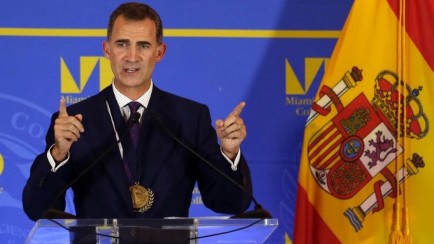
Spain’s King Felipe VI is stepping once more into the impasse that has paralysed Spain’s government for around eight months.
Could we be about to see the end to a political impasse that has trundled on for more than six months?
The signs are indeed positive that Spain could end this week with a new government in place after King Felipe VI began the legal procedure last Thursday that gives the acting Prime Minister one week to form a government…
Since repeat elections were held on June 26 (after last December’s initial general election failed to identify a clear winner), Mariano Rajoy has remained in temporary charge as Prime Minister as the various parties seek, once again, to strike a deal.
But this time the King is adamant that there will be no third election, and thus met with new speaker of Congress Ana Pastor to discuss all of the possible political deals, partnerships and problems that lie ahead. The King’s main aim is to put an end to the deadlock that has all but paralysed Spain’s political sector since last December.
Interestingly, Spain’s economy has actually performed very well during this period, with GDP and job figures both rising, and certain industries – most notably the real estate industry – enjoying robust growth and confidence.
However, there are issues that need to be addressed at the highest level, not least the threat of a fine from the EU for overshooting the country’s deficit containment. Hence, King Felipe will speak with Rajoy, who leads the Popular Party (PP), to discuss the options open to him. Having won the most seats at both elections, there is a growing feeling that the onus falls on Rajoy to break the deadlock and arrange a workable solution for the good of the country.
The Socialists have recently staked a claim for leadership but found support from other parties was not forthcoming, which has made things a little trickier for all concerned – very few of the smaller parties wish to get into bed with the PP, while the Socialists, which won the second-most votes, are also finding it hard to reach collaborative deals with other mid-sized parties.
Yet despite King Felipe’s involvement, failure once more among the parties to reach an agreement may well lead to a record third election – something that very few people in the upper echelons of Spanish society or government really want to face.
Under Article 99 of the Spanish Constitution, the monarch must meet with leading candidates and decide which one, if any, is best placed to form a government, although the King has no direct power to force through any deals.
 en
en



 Vlaams-Nederlands
Vlaams-Nederlands
0 Comments
Leave a Comment
DISCLAIMER
The opinions and comments expressed by contributors to this Blog are theirs alone and do not necessarily reflect the views of VIVA Homes Under the Sun Ltd, any of its associated companies, or employees; nor is VIVA to be held responsible or accountable for the accuracy of any of the information supplied.
Have you got something to say?